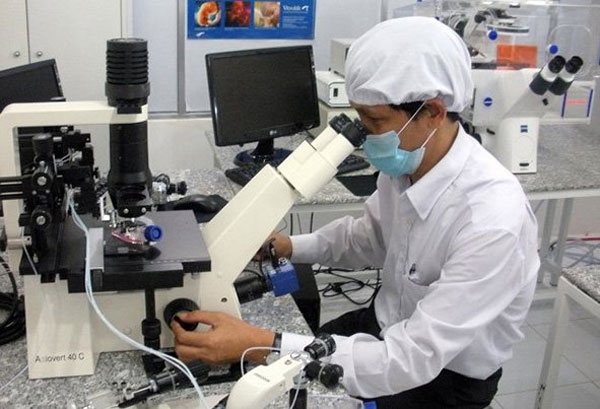
Le Quang Minh, former deputy director of the Vietnam National University in HCMC, underscored the point at a seminar on science and technology strategies for the development of society in HCMC last week.
Minh and other experts at the seminar share the same viewpoint that ties between local scientists and enterprises are loose. This is one of the reasons why local firms are willing to spend money importing machines and technology from China rather than what local scientists have studied.
 |
|
A scientist works in a laboratory of the Vietnam National University in HCMC. Experts say cooperation between local scientists and enterprises remains loose |
Technology consultant Nguyen Manh Hung from the HCMC Rubber and Plastics Association said enterprises do not need scientists to tell them what to buy because they know what to invest in. What businesses want to know scientists’ made-to-order research can help them solve problems and operate better.
Minh said development orientations envisioned in the nation’s science-technology strategies are unclear while there remain many barriers to scientists’ research. There should be practical and cost-effective changes to these strategies in the long term.
Minh noted it seemed that Vietnam depended much on foreign-invested enterprises for technology development instead of domestic firms, but most of the FDI firms have brought outdated technologies to the country.
Nguyen Thanh Nam from the Vietnam National University in HCMC said the university has earned total revenue of VND565 billion (US$26.4 million) from technology transfers since 2011. However, the school is facing many difficulties in such transfers due to a lack of further investments in studies and lower competitiveness than the private sector.
In the last four years, scientists working at member schools of the university have had 1,277 articles published on scientific journals worldwide with 70% of them on prestigious journals.






- Hanoi honors outstanding faces in innovation, digital transformation
- Land deed digitization accelerated in Hanoi
- Vietnam's capital boosts iHanoi usage by citizens
- Technology, innovation identified as key drivers for Hanoi's growth
- Hanoi intensifies efforts to achieve its digital goals by 2025
- Second Hanoi Technical Innovation Contest launched
